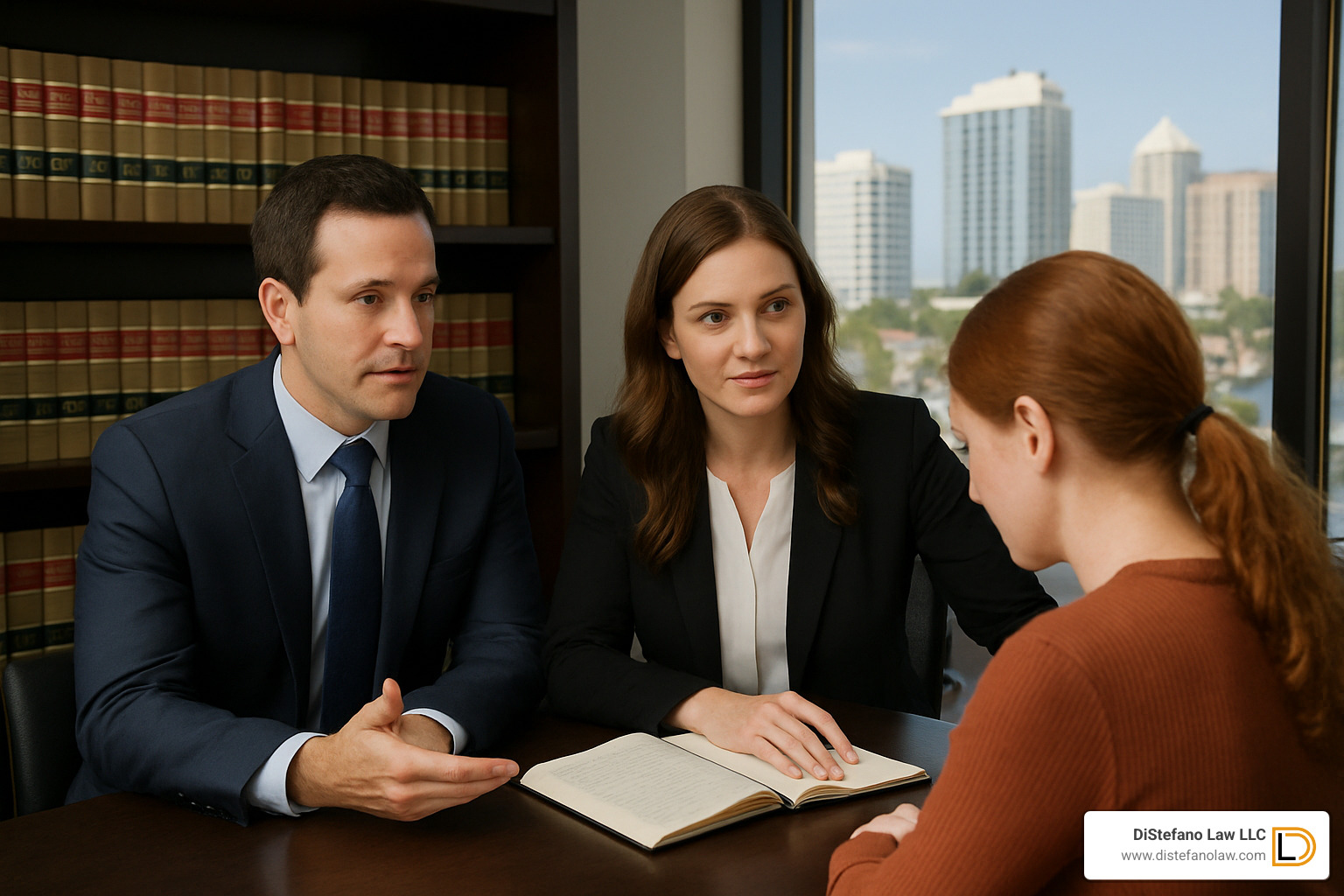When Life Changes in an Instant: Finding Help After a Brain Injury
If you’re searching for a brain injury law firm Fort Lauderdale to help after a traumatic accident, here’s what you need to know:
- Free Consultation: Most reputable Fort Lauderdale brain injury attorneys offer no-cost case evaluations
- No Fees Unless You Win: Work with lawyers on a contingency basis (no upfront costs)
- 2-Year Deadline: Florida has a two-year statute of limitations for filing brain injury claims
- Specialized Experience Matters: Look for attorneys with specific brain injury case experience
- Medical Connections: The best firms have relationships with neurologists and brain injury specialists
A traumatic brain injury can change your life in seconds. One moment you’re driving down I-95, shopping at a local store, or walking along Las Olas Boulevard—the next, you’re facing mounting medical bills, cognitive challenges, and an uncertain future.
Every day in the United States, over 600 people suffer traumatic brain injuries, with approximately 176 TBI-related deaths occurring daily. Here in Fort Lauderdale, brain injuries commonly result from car accidents, slip-and-falls, construction incidents, and boating accidents.
When someone else’s negligence causes your brain injury, you shouldn’t have to shoulder the financial burden alone. The right legal team can make the difference between struggling to cover basic medical costs and securing compensation that provides for long-term care, lost wages, and quality of life.
Brain injuries are particularly complex because symptoms may not appear immediately, insurance companies often minimize their severity, and proving the full extent of cognitive and emotional damage requires specialized expertise.
At their core, brain injury cases require attorneys who understand both the medical nuances of TBIs and the unique legal challenges they present in Florida courts.
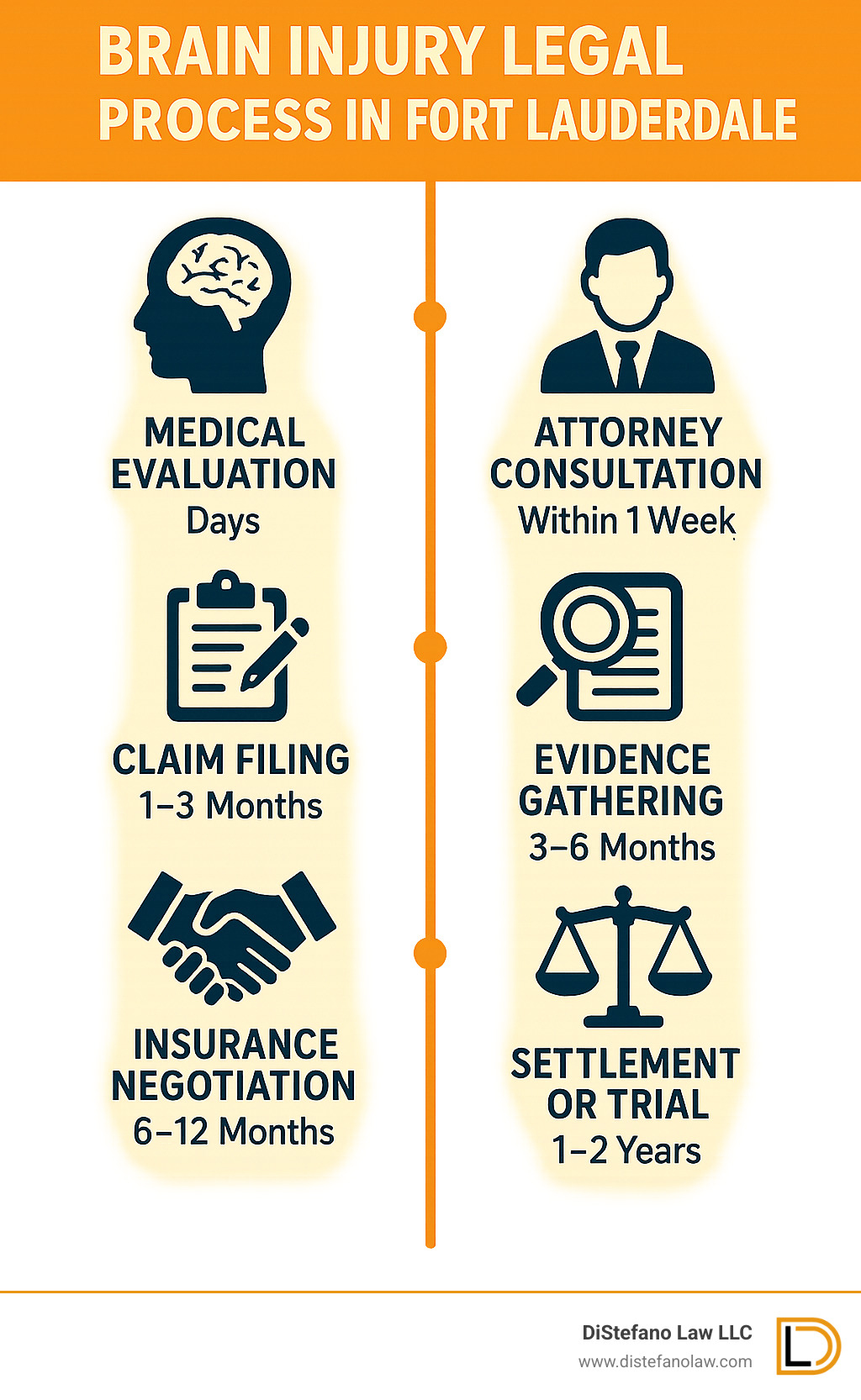
Brain Injuries 101: What Victims & Families Must Know
Every year, about 1.7 million Americans suffer traumatic brain injuries. Adults over 65 and teenagers between 15-19 years face the highest risks. If you or someone you love has experienced a brain injury, understanding what you’re facing is the first crucial step toward proper treatment and fair compensation.
Traumatic Brain Injury (TBI) Explained
A traumatic brain injury happens when an external force disrupts your brain’s normal function. Unlike a broken bone or a cut that you can see, brain injuries often hide beneath the surface while profoundly affecting your life.
As a brain injury law firm Fort Lauderdale that has helped countless families through these difficult times, we’ve seen TBIs typically fall into two categories:
When your brain gets jostled inside your skull without breaking it, that’s a closed brain injury. These include concussions (the most common type), contusions (bruising of brain tissue), and diffuse axonal injuries (tearing of nerve fibers). These injuries might not show up on standard imaging but can still change your life dramatically.
Open or penetrating brain injuries occur when something breaks through your skull and directly damages brain tissue. While less common, these injuries are often more severe and immediately life-threatening.
Doctors typically use the Glasgow Coma Scale to assess TBI severity. This 15-point test evaluates eye-opening, verbal responses, and motor functions. A score of 13-15 suggests a mild injury, 9-12 indicates moderate damage, and 8 or below signals severe trauma. But don’t be misled by the term “mild” – even so-called mild TBIs can have serious, lasting effects.
What many people don’t realize is that secondary injuries – complications like swelling, bleeding, or infection that develop after the initial trauma – sometimes cause more damage than the original injury itself.
Typical Symptoms & Long-Term Effects
Brain injury symptoms vary widely depending on what part of your brain was injured and how severely. You might experience persistent headaches that medication barely touches. Memory problems might make familiar tasks suddenly challenging. Some people struggle with dizziness, balance issues, or sensitivity to light and sound that transforms everyday environments into overwhelming spaces.
Communication difficulties, mood swings, irritability, and sleep disturbances are also common. In more severe cases, seizures may develop, even years after the initial injury.
Children show their brain injuries differently. Instead of being able to tell you about a headache, a child might become unusually irritable, lose interest in favorite toys, cry persistently without being consoled, or show changes in eating or sleeping patterns.
The long road ahead can be challenging. Research from the Mayo Clinic shows that TBI survivors face increased risks of developing neurodegenerative conditions like dementia and Parkinson’s disease years after the initial injury. A single moderate or severe TBI can increase dementia risk by 24%, according to recent studies.
How a Brain Injury Alters Work, Life & Relationships
A brain injury creates ripples that touch every aspect of your life. About 60% of people with moderate to severe TBIs cannot return to their previous jobs. Some need complete career changes, while others face permanent disability and the financial strain that comes with it.
Family dynamics often shift dramatically when brain injuries enter the picture. Spouses, parents, or children may suddenly become full-time caregivers, creating both financial and emotional pressure. Studies consistently show that these caregivers experience significantly higher rates of depression and anxiety than the general population.
The person you’ve known and loved might seem different after a brain injury. Personality changes, difficulty regulating emotions, and cognitive impairments can fundamentally alter relationships. It’s a sad reality that divorce rates climb notably higher among couples where one partner has suffered a TBI.
Many survivors find themselves increasingly isolated. Communication difficulties make conversations frustrating. Behavioral changes strain friendships. Physical limitations make formerly enjoyable activities impossible. Gradually, social circles shrink.
Mental health challenges often compound these difficulties. Depression is approximately 8 times more common in TBI survivors than in the general population. Anxiety disorders, PTSD, and substance abuse issues also occur at higher rates as people struggle to cope with their new reality.
The financial impact is staggering. When you account for medical care, rehabilitation, lost productivity, and long-term support services, lifetime costs for a severe TBI can exceed $3 million per person. This is why having knowledgeable legal representation is so crucial for families facing this journey.
Fort Lauderdale Hotspots: Causes & Early Action Steps
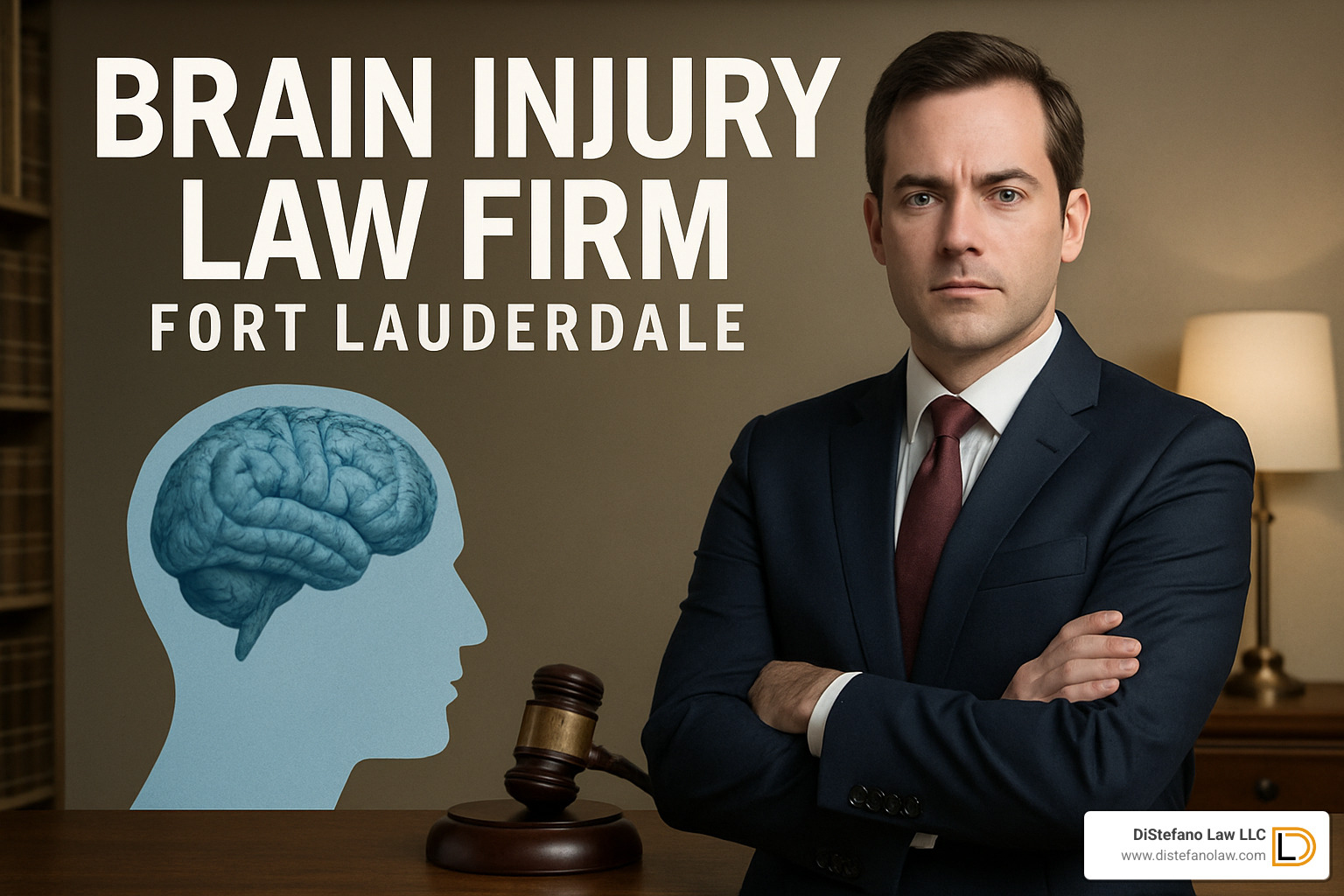
Living in the Venice of America has its perks—beautiful beaches, vibrant nightlife, and year-round sunshine. But our paradise also comes with unique risks for brain injuries that locals and tourists should be aware of.
Most Common Local Causes of Brain Injuries
If you’ve driven on I-95 during rush hour, you’ve experienced one of Fort Lauderdale’s most dangerous brain injury hotspots firsthand. Our busy highways and intersections—particularly where Commercial Boulevard meets Federal Highway—see countless serious collisions every year. In fact, motor vehicle accidents account for nearly 60% of traumatic brain injuries worldwide.
But our roads aren’t the only concern. Our beautiful coastline brings its own risks. As the “Boating Capital of the World,” Fort Lauderdale sees numerous watercraft accidents annually. From jet ski collisions to diving mishaps, water activities can lead to devastating brain trauma when safety precautions aren’t followed.
Our seniors face particular dangers too. With wet floors in beachfront hotels and uneven sidewalks throughout the city, slip and fall accidents account for 20-30% of all TBIs, with older residents and visitors most vulnerable.
The constant construction reshaping our skyline puts workers at risk from falling objects, scaffolding collapses, and equipment accidents. Meanwhile, our active lifestyle contributes to sports-related concussions, especially in youth football, soccer, and cheerleading programs throughout Broward County.
Even our vibrant nightlife occasionally turns dangerous, with assaults in entertainment districts leading to serious head trauma. And workplace incidents extend beyond construction sites to warehouses, manufacturing facilities, and even seemingly safe office environments.
Immediate Checklist After a Suspected Head Injury
The moments after a head injury are critical. If you’re at Las Olas Boulevard and someone in your group takes a bad fall, don’t hesitate—seek immediate medical attention. Even if they insist they’re “just fine,” the nearest emergency room (like Broward Health Medical Center) should be your next stop.
While waiting for help, document everything you can. Snap photos of that uneven sidewalk, the wet floor without warning signs, or whatever caused the accident. If strangers stopped to help, get their contact information—their testimony could prove invaluable later.
For vehicle accidents, make sure to file a police report. Workplace injuries require an incident report, and premises injuries should be documented with management. Don’t forget to notify your insurance company about what happened.
Hold onto everything—damaged items, torn clothing, medical records, prescriptions, and receipts. These pieces of evidence tell the story of your injury and its impact. And while it might be tempting to update friends on social media, avoid posting about your accident online. Insurance companies routinely check social media and may use your posts to minimize your claim.
Once your condition stabilizes, contact a brain injury law firm Fort Lauderdale specialists who understand both the medical complexities of TBIs and the local legal landscape.
When to Seek Medical Help for Delayed Symptoms
Brain injuries can be sneaky—sometimes symptoms don’t appear right away. You might leave the scene of a fender-bender on A1A feeling fine, only to develop concerning symptoms hours or days later.
Watch for persistent headaches that won’t go away with over-the-counter medication. If you’re suddenly having trouble finding words or your speech becomes slurred, that’s your body sending an urgent message to get help. Increased confusion, unusual drowsiness, or difficulty waking up are all red flags that shouldn’t be ignored.
Physical symptoms like nausea, repeated vomiting, weakness in your arms or legs, or problems with coordination require immediate medical attention. And if you experience seizures or notice one or both pupils becoming dilated, head to the emergency room without delay.
Parents need to be especially vigilant with children after any bump to the head. If your little one refuses to eat, cries inconsolably, or shows changes in how they play or pay attention, trust your instincts and seek medical help.
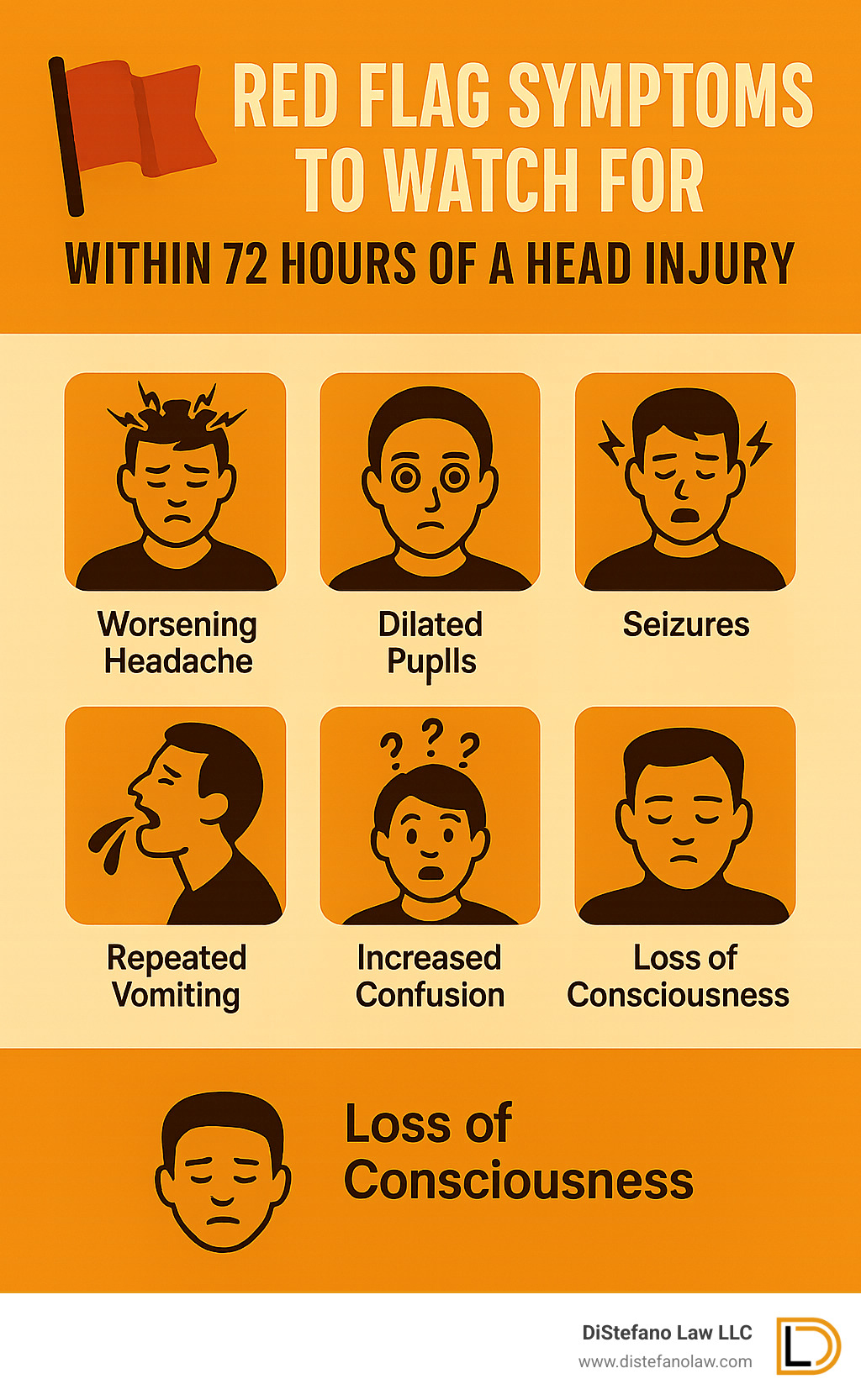
The first 72 hours after a head injury are particularly critical. During this window, what seemed like a minor bump can sometimes develop into something more serious. Don’t hesitate to return to the doctor if new symptoms emerge or existing ones worsen—when it comes to brain injuries, it’s always better to be cautious.
When & How to Call a Brain Injury Law Firm Fort Lauderdale
The clock starts ticking the moment your injury occurs. In Florida, you have just two years from the date of your brain injury to file a lawsuit—miss this deadline, and you could permanently lose your right to compensation. This is why reaching out to a brain injury law firm Fort Lauderdale shouldn’t be something you put off until tomorrow.
Building a successful brain injury claim requires establishing four critical elements. Think of these as the foundation of your case: first, proving the other party owed you a duty of care (like a driver’s obligation to follow traffic laws); second, showing they breached that duty; third, demonstrating this breach directly caused your injury; and finally, documenting the actual damages you’ve suffered as a result.
It’s also important to understand that Florida follows “comparative negligence” rules. This means if you’re found partially responsible for what happened—say 20% at fault—your compensation would be reduced accordingly, allowing you to recover 80% of your damages. The sooner you connect with experienced legal help, the better your chances of preserving crucial evidence before it disappears.
Proving Negligence or Fault
Establishing who’s responsible for a brain injury often requires sophisticated detective work. Accident reconstruction specialists can analyze exactly how a crash occurred, pinpointing the physics of the impact that caused your injury. Electronic evidence like vehicle black box data, traffic camera footage, and even cell phone records can tell a compelling story about what really happened.
Medical experts play a critical role too. Neurologists and radiologists can explain in clear terms how your injury occurred and what it means for your future. When your ability to work is affected, vocational experts step in to translate your medical limitations into real-world consequences for your career and earning potential.
Life care planners provide another crucial piece of the puzzle by calculating the lifetime costs of your care needs—from ongoing therapy to home modifications and specialized equipment. And never underestimate the power of eyewitness accounts, which often provide the human perspective that brings technical evidence to life.
The most effective brain injury law firm Fort Lauderdale will have established relationships with respected experts across all these fields, knowing exactly who to call and how to present their findings in the most compelling way.
Economic vs Non-Economic Damages
When it comes to compensation, brain injury cases typically involve two main categories of damages. Economic damages cover the concrete financial losses you can calculate: current and future medical bills, rehabilitation costs, lost wages, home modifications needed for accessibility, specialized equipment, long-term care expenses, and even transportation costs for medical appointments.
But equally important are non-economic damages—the profound personal impacts that don’t come with receipts attached. These include your physical pain and emotional suffering, the enjoyment of life you’ve lost, the strain on your marriage (legally called “loss of consortium”), any disfigurement you’ve experienced, and the mental anguish that often accompanies serious brain injuries.
In cases involving truly outrageous conduct, punitive damages might also be available. Unlike other compensation that makes you whole, these damages specifically punish wrongdoers for extreme negligence or intentional misconduct, serving as a deterrent to prevent similar behavior in the future.
Understanding Contingency Fees & Legal Costs
One of the greatest barriers to justice is fear about legal costs—but it shouldn’t be. Most brain injury law firms in Fort Lauderdale work on a contingency fee basis, which means you don’t pay anything upfront. The firm advances all the expenses of building your case, from filing fees to expert witness costs.
Attorneys only collect payment as a percentage of your settlement or verdict, typically ranging from 33% to 40% depending on whether your case settles or goes to trial. If you don’t recover compensation, you typically owe nothing for their services—aligning the attorney’s interests perfectly with your own.
When meeting with potential attorneys, don’t hesitate to ask for clear explanations of their fee structure. How do they handle case expenses? What happens if you don’t win? Reputable firms like DiStefano Law provide this information in writing through transparent fee agreements, ensuring you fully understand the financial arrangement before moving forward.
The contingency fee system opens the courthouse doors to everyone, regardless of financial situation—meaning you can focus on healing while experienced professionals handle the legal battle for the compensation you deserve.
Building a Powerful Claim with a Brain Injury Law Firm Fort Lauderdale
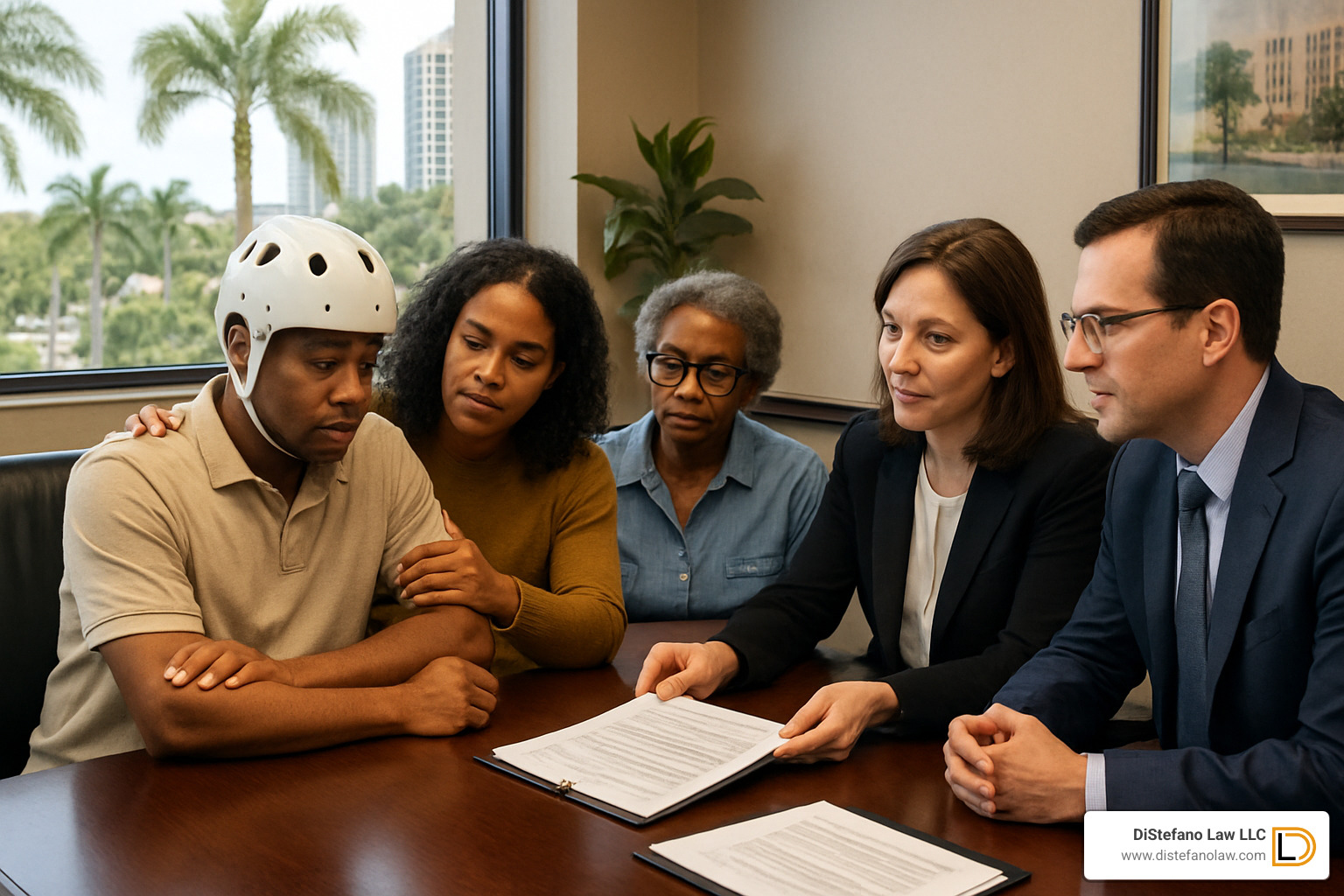
When you partner with a dedicated brain injury law firm Fort Lauderdale, you’re not just hiring a lawyer—you’re gaining an advocate who will build a comprehensive strategy for your recovery.
Your legal team should start with a thorough investigation, gathering everything from police reports to surveillance footage that captures how your injury occurred. They’ll work closely with your healthcare providers to ensure every aspect of your injury is properly documented—because in brain injury cases, details matter.
What sets exceptional attorneys apart is their network of experts. Your lawyer should bring in medical specialists who can explain complex brain injuries in terms anyone can understand. They’ll translate your experience into evidence that stands up to scrutiny, whether in settlement negotiations or in the courtroom.
Insurance companies aren’t in the business of generous payouts. They often use surveillance, monitor your social media, or pressure you to accept quick settlements before you understand the full extent of your injuries. An experienced brain injury law firm Fort Lauderdale anticipates these tactics and shields you from them, giving you space to focus on what matters most—your recovery.
Role of Medical & Financial Experts
Brain injuries are uniquely challenging because many of their effects aren’t visible to the naked eye. This is where expert testimony becomes invaluable.
Your neurologist might identify specific damage to brain tissue, while a neuropsychologist assesses how that damage affects your thinking, emotions, and behavior. Neuroradiologists interpret complex brain imaging that shows what’s happening beneath the surface. These medical experts don’t just validate your experience—they translate it into evidence that judges and juries can understand.
On the financial side, economists calculate exactly how much income you’ll lose over your lifetime if you can’t return to your former career. Life care planners map out every dollar you’ll need for future medical care, from medications to therapy sessions. These projections aren’t guesswork—they’re detailed roadmaps based on thousands of similar cases and medical research.
According to the Cleveland Clinic, “Recovery from a TBI can be a lifelong process,” which is why these financial projections must be thorough and far-reaching. Your attorney should work with experts who understand the latest research on treatments and prognoses to ensure your settlement accounts for your actual needs.
Resources & Support for Victims in Broward County
Recovery doesn’t happen in isolation. Fort Lauderdale residents have access to specialized support systems that can make a world of difference.
The Florida Brain and Spinal Cord Injury Program provides case management and sometimes financial assistance for eligible survivors. You can reach their Central Registry at 800-342-0778 to learn if you qualify. The Brain and Spinal Cord Injury Resource Center connects survivors with local support groups where you can meet others who truly understand what you’re experiencing.
For specialized rehabilitation, NeuroRestorative Florida offers programs designed specifically for brain injury recovery. Veterans and older adults with brain injuries can find additional support through Broward County’s Elderly and Veterans Services Division.
A compassionate brain injury law firm Fort Lauderdale doesn’t just handle your legal claim—they connect you with these vital resources while simultaneously fighting for your compensation. This comprehensive approach ensures you’re supported on all fronts during your recovery journey.
Maximizing Compensation & Speeding Recovery
Winning your case is just the beginning. How your settlement is structured can dramatically impact your financial security for years to come.
Your attorney should discuss options like structured settlements, which provide tax advantages and ensure your funds last throughout your lifetime. If you’re eligible for Medicare, proper planning with Medicare set-asides protects your future benefits while giving you access to your settlement.
Many clients don’t realize that medical providers, health insurers, and government programs like Medicaid may place liens on their settlements. A skilled attorney negotiates these liens down, sometimes dramatically increasing what you actually take home.
For those with significant disabilities, supplemental needs trusts can preserve eligibility for government benefits while allowing access to settlement funds. Your attorney might also help you pursue parallel claims for Social Security Disability or workers’ compensation benefits, creating multiple streams of support.
The Florida Brain and Spinal Cord Injury Program can sometimes help with housing modifications to improve accessibility. A knowledgeable brain injury law firm Fort Lauderdale connects you with these resources while handling the complex financial aspects of your case.
By addressing both your immediate needs and long-term financial security, your legal team helps you focus on what matters most—rebuilding your life after a traumatic brain injury. At DiStefano Law LLC, we believe this comprehensive approach gives clients the best chance at both physical recovery and financial stability. To learn more about how we can help with your specific situation, explore our full range of Practice Areas.
Frequently Asked Questions about Brain Injury Claims in Fort Lauderdale
What is the deadline to file my TBI lawsuit in Florida?
In Florida, timing is critical when it comes to brain injury claims. Generally, you have just two years from the date of your injury to file a lawsuit. This deadline isn’t just a suggestion—courts enforce it strictly, and missing it typically means losing your right to compensation, regardless of how strong your case might be.
There are some situations where this timeline might be extended, though these exceptions are limited. If you didn’t find your injury immediately, the “findy rule” might allow the clock to start when you reasonably should have finded the injury. For children, the deadline may extend until they reach adulthood. And if the defendant leaves Florida after causing your injury, their time away might not count toward your two-year limit.
Given these strict timelines, connecting with a brain injury law firm Fort Lauderdale as soon as possible after your injury isn’t just helpful—it’s essential for protecting your rights.
Can I have a brain injury and not know it?
Many people are surprised to learn that yes, you absolutely can have a brain injury without immediately recognizing it. The brain is complex, and injuries—especially mild traumatic brain injuries or concussions—often present with delayed or subtle symptoms that are easy to miss or attribute to something else.
I’ve seen clients who didn’t develop noticeable symptoms until days or even weeks after their accident. It’s particularly common after car accidents, where adrenaline masks pain and symptoms initially. Athletes often downplay head impacts to stay in the game. Workers might fear reporting injuries could jeopardize their job. And after a fall, many people feel embarrassed and minimize what happened.
This delayed recognition creates real challenges, both for proper medical treatment and for your legal claim. Insurance companies frequently argue that an injury couldn’t be serious if you didn’t seek immediate medical attention.
If you’ve experienced any head trauma, even something that seemed minor, watch for warning signs: persistent headaches, confusion, memory problems, sleep changes, mood swings, or new sensitivity to light and noise. When in doubt, get checked out—your brain is too important to take chances with.
How much compensation can brain injury victims typically receive?
This is often the first question clients ask, and it’s completely understandable. Brain injuries can create enormous financial pressure, and you need to know what to expect. The honest answer is that compensation varies widely based on several factors, but I can give you some general ranges:
For mild TBIs with full recovery, settlements typically range from $10,000 to $100,000. Moderate brain injuries with some lasting effects might see $100,000 to $500,000. Severe TBIs with significant impairment often result in settlements between $500,000 and several million dollars. And catastrophic injuries requiring lifetime care can potentially reach $5 million to $10+ million.
What drives these differences? Several key factors influence your potential compensation: your current and future medical expenses, lost income and earning capacity, your age, your occupation and income before the injury, your need for ongoing care, the impact on your quality of life, and the extent of your pain and suffering.
Another crucial factor is whether liability is clear or shared. Florida uses comparative negligence rules, which means your compensation may be reduced by your percentage of fault in the accident.
It’s also important to understand that available insurance coverage often constrains recoverable amounts. If a negligent driver carries only Florida’s minimum coverage ($10,000 in property damage liability), your recovery might be limited unless they have substantial personal assets or other applicable insurance policies.
An experienced brain injury law firm Fort Lauderdale can identify all potential sources of compensation, including umbrella policies, employer liability, third-party claims, and underinsured motorist coverage to maximize your recovery.
Conclusion
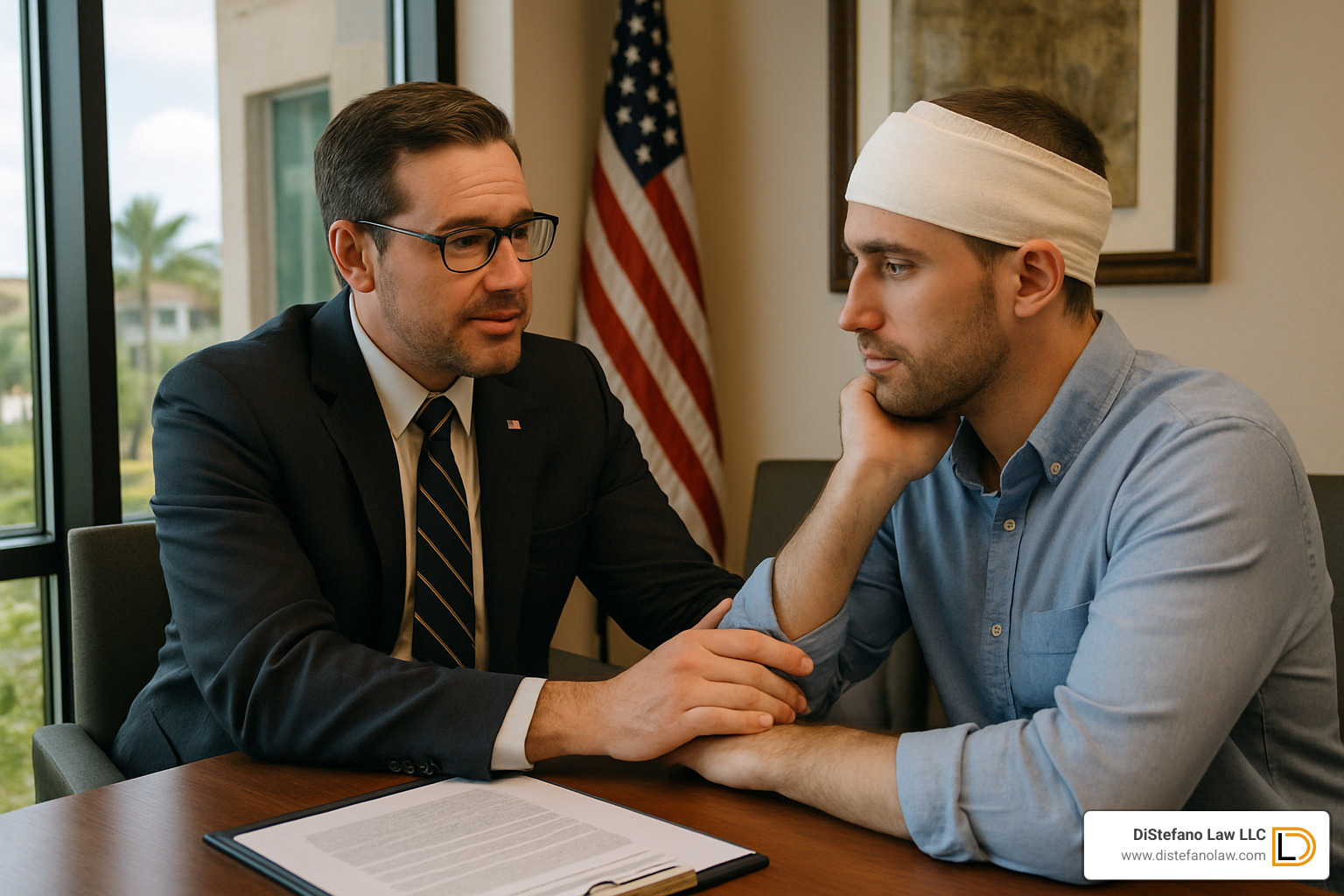
The journey after a brain injury is rarely straightforward, but you don’t have to walk this path alone. When life changes in an instant, having knowledgeable legal advocates by your side can make all the difference between struggling to make ends meet and securing the resources needed for proper healing and adaptation.
Brain injuries reshape not just the victim’s life but the lives of everyone who loves them. We’ve seen how families pull together during these challenging times, often making tremendous sacrifices to support their injured loved one. Your dedication deserves to be matched by legal representation that fights just as hard for your future.
The most important steps you can take right now are:
Prioritize medical care even if symptoms seem minor at first. That persistent headache or unusual fatigue might be signaling something more serious that needs attention.
Document everything related to your injury and recovery. Those notes on your phone about daily symptoms or photos of your medications might prove invaluable later.
Connect with local support resources here in Broward County. You’ll find comfort and practical advice from others who truly understand what you’re experiencing.
Remember the time limits for legal action in Florida. Those two years can pass surprisingly quickly when you’re focused on recovery.
At DiStefano Law LLC, we’ve spent over four decades helping brain injury survivors throughout Fort Lauderdale and South Florida rebuild their lives after unexpected trauma. We understand that each case represents a real person with unique needs, worries, and hopes for the future.
The path to recovery may seem overwhelming now, but with proper support, many brain injury survivors go on to reclaim fulfilling, meaningful lives. Some even find new strengths and perspectives they never knew they possessed.
When you’re ready to discuss your situation, we’re here to listen with compassion and respond with clear, practical guidance. Our free case consultations come with no pressure or obligation—just honest answers about your options and potential next steps.
Hope and healing are possible. Learn more about our personal injury services or call us today to schedule your complimentary case review. Let’s take that first step forward together.


